
Chaetostoma, also known as the bristlemouth catfish, is a genus of suckermouth armored catfishes native to South America with one species, C. fischeri, extending into Panama. Most species inhabit flowing rivers in the lower Andes and its foothills. Some species are kept in unheated aquaria.
Chaetostoma anale is a species of catfish in the family Loricariidae. It is a freshwater species native to South America, where it occurs in the Orteguaza River basin, which is part of the Japurá River drainage in Colombia. The species reaches 16 cm in total length.

Chaetostoma anomalum is a species of catfish in the family Loricariidae. It is native to South America, where it occurs in the basins of Lake Maracaibo, the Chama River, the Capazon River, and the Escalante River in Venezuela. The species reaches 16 cm in total length.

Chaetostoma breve is a species of catfish in the family Loricariidae. It is native to South America, where it occurs in the Zamora River basin, which is part of the Marañon River drainage in Ecuador. The species is large for a loricariid, reaching 30 cm in total length.
Chaetostoma brevilabiatum is a species of catfish in the family Loricariidae. It is native to South America, where it occurs in the basins of the Magdalena River and the Cimitarra River in Colombia. The species reaches 11.9 cm SL and is known from high-altitude environments.
Chaetostoma vagum is a species of catfish in the family Loricariidae. It is native to South America, where it occurs in the Orteguaza River basin, which is part of the Japurá River drainage in Colombia. The species reaches 9.9 cm SL.
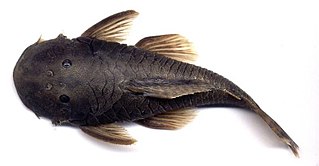
Chaetostoma thomsoni is a species of catfish in the family Loricariidae. It is native to South America, where it occurs in the Magdalena River basin in Colombia. The species reaches 10.1 cm in total length. It is sometimes seen in the aquarium trade, sometimes as Chaetostoma thomasi, a name which originated as a misspelling but has become relatively widely used despite being incorrect.
Chaetostoma taczanowskii is a species of catfish in the family Loricariidae. It is native to South America, where it occurs in the basins of the Huallaga River and the Urubamba River in Peru. The species reaches 17 cm in total length.
Chaetostoma dermorhynchum is a species of catfish in the family Loricariidae. It is native to South America, where it occurs in the basins of the Pastaza River, the Bobonaza River, the Napo River, and the Curaray River in Ecuador. The species reaches 25 cm in total length.
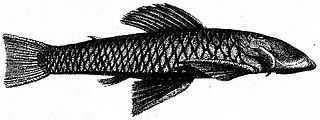
Chaetostoma loborhynchos is a species of catfish in the family Loricariidae. It is native to South America, where it occurs in the Tambo River basin, which is part of the Ucayali River drainage in Peru. The species reaches 14.2 cm SL. It is the type species of the genus Chaetostoma.
Chaetostoma lepturum is a species of catfish in the family Loricariidae. It is native to South America, where it occurs in the San Juan River basin in Colombia. The species reaches 21.5 cm SL.
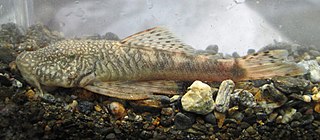
Chaetostoma leucomelas is a species of catfish in the family Loricariidae. It is native to South America, where it occurs in the basins of the Patía River and the Cauca River in Colombia. The species reaches 20 cm SL.
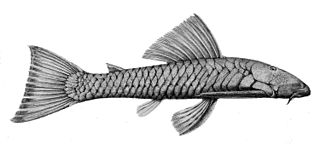
Chaetostoma marginatum is a species of catfish in the family Loricariidae. It is native to South America, where it occurs in the basins of the Bogotá River, the Chimbo River, and the San Juan River. The species reaches 19 cm SL.
Chaetostoma stannii is a freshwater species of catfish in the family Loricariidae. It is a demersal fish with a distribution entirely within tropical South America, where it is native to the basins of the Aroa River, the Tocuyo River, the Urama River, and the Yaracuy River in Venezuela. It has a maximum reported total length of 20.5 cm.
Chaetostoma marmorescens is a species of catfish in the family Loricariidae. It is native to South America, where it occurs in the Huallaga River basin in the Marañón River drainage in Peru. The species reaches 13.5 cm SL and reportedly inhabits high-altitude areas.
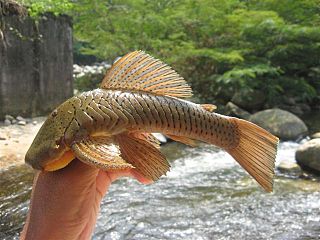
Chaetostoma milesi is a species of catfish in the family Loricariidae. It is native to South America, where it occurs in the basins of the Magdalena River and the Apure River. The species reaches 13 cm SL. It appears in the aquarium trade, where it is most frequently referred to as either the bulldog pleco or the rubbernose pleco.
Chaetostoma sovichthys is a freshwater species of catfish in the family Loricariidae and the genus Chaetostoma. It is a demersal fish native to tropical South America, where it occurs in the basins of the Motatán River and Lake Maracaibo in Venezuela. It reaches 7.2 cm SL. The species reportedly prefers a pH of 6.0 to 7.0 and a temperature of 23 to 27°C.
Chaetostoma palmeri is a species of catfish in the family Loricariidae. It is native to South America, where it occurs in the Tamana River basin in the San Juan River drainage in Colombia. The species reaches 9.5 cm in total length.
Chaetostoma paucispinis is a species of catfish in the family Loricariidae. It is native to South America, where it occurs in the San Juan River basin in Colombia. The species reaches 9 cm in total length.
Chaetostoma pearsei is a species of catfish in the family Loricariidae. It is native to South America, where it occurs in the basins of the Tuy River and Lake Valencia in Venezuela. The species reaches 15 cm in total length.








